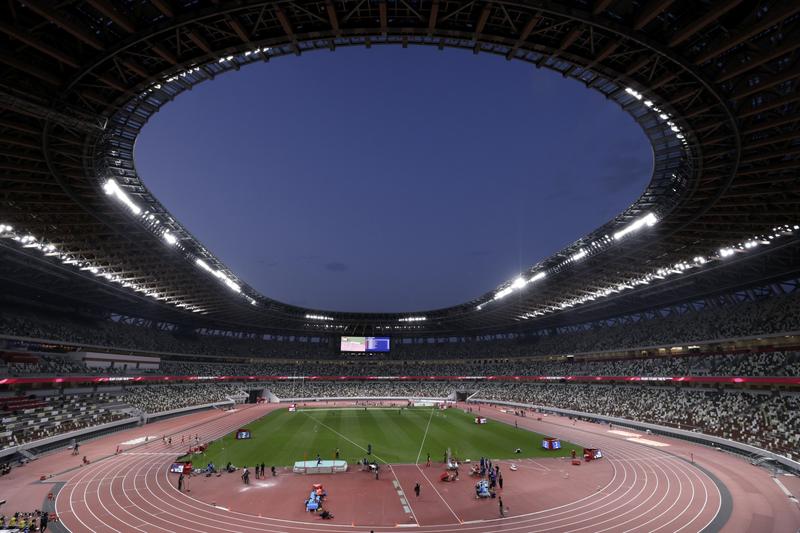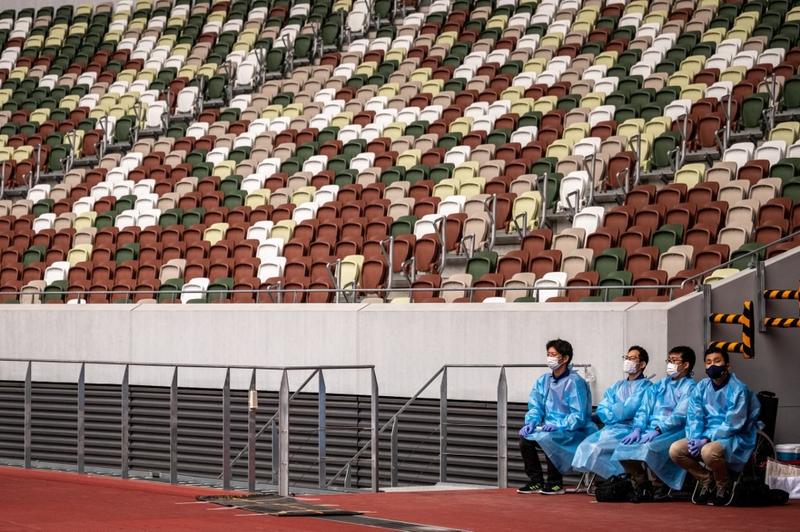 This May 9, 2021, photo shows the National Stadium during a test event for Tokyo 2020. (KIYOSHI OTA / BLOOMBERG)
This May 9, 2021, photo shows the National Stadium during a test event for Tokyo 2020. (KIYOSHI OTA / BLOOMBERG)
Veteran Malaysian diver Pandelela Rinong has competed in three Olympics and is no stranger to the rigors of competitive sports. But never before has she experienced anything like the preparations for next month’s Tokyo Games.
Since the original 2020 event was postponed, the International Olympic Committee and local organizers in Japan have been determined to show the world the event can be pulled off successfully with stringent safety controls
Living in a training bubble to keep out COVID-19, the 28-year-old hasn’t seen her family for a year. Her life in Kuala Lumpur is stuck in a loop between a training facility and her residence, a three-minute walk away — though she must use a transit van to minimize interaction with potentially infected members of the public. The only company she keeps is with fellow athletes.
“It’s not really healthy to be training like this in a quarantine base,” said the current women’s 10 meter platform champion who has two Olympics medals. “We only train mostly inside and you cannot even leave the complex.”
Pandelela will be among 11,000 athletes soon arriving in Tokyo as Japan presses ahead with the world’s biggest sporting event set to start July 23 amid the worst public health crisis in a generation. There’s a loud clamor domestically to cancel or delay the games again out of fears that it could be a COVID-19 superspreading event. Public health experts have called it irresponsible at a time when the pathogen and its more dangerous variants still take lives in many parts of the world.
For the aspiring athletes, the road to this year’s Olympics and Paralympics has been long, uncertain and arduous. And the event itself is likely to be strangely lifeless — no pomp and splendor, no revelry after victories and no families to offer support. Instead, just a smattering of domestic spectators will be silently watching in the stands.
ALSO READ: Japan to keep 10,000-person event limit as Olympics loom
Welcome package
Instead, their welcome package will contain a 70-page document outlining rules on movements and behavior during the games, as well as potential fines if they break protocol. Athletes will be subject to a three-day quarantine upon arrival and will be required to get tested daily. They must stay in a bubble within the athletes’ village. Socializing and group meals are prohibited. And they must depart Japan within 48 hours of their last event.
Still, the only thing worse than the COVID-19-era Olympics would be not being able to compete at all, they say.
“Take away the Olympics, and a big chunk of my ‘why’ is gone,” said Kate Nye, a Team USA weightlifter who’s the current world champion in the women’s 71 kilograms division and is competing in her first Olympics.
Winning a medal on the world stage is an obvious draw for athletes, but success at the Olympics could also mean more money and recognition through sponsorship deals or government support. For some, this could be their only shot at a medal. While an extra year to train helps, they say the anxiety surrounding the uncertainty has been unnerving.
Daily testing
Since the original 2020 event was postponed, the International Olympic Committee and local organizers in Japan have been determined to show the world the event can be pulled off successfully with stringent safety controls.
With only a month to go, the event is still controversial in Japan and around the world. Local epidemiologists are predicting that the Olympics could coincide with a fresh wave of COVID-19 cases due to the spread of variants. Influential bodies, like the Asahi newspaper that’s also an official sponsor, have advocated cancellation in recent months, creating uncertainty over whether the event would proceed.
Prime Minister Yoshishide Suga said late Thursday that organizers will cap the number of domestic spectators at 10,000, about a seventh of the main stadium’s capacity — but even that decision could be backtracked depending on the state of the virus spread, according to local media reports.
“Some people have asked us what Japan’s situation is, but honestly with this pandemic, we don’t know anything,” said Ryo Takahashi, a Japanese sailor who lives and trains in New Zealand.
In Japan, athletes have faced calls from the public to drop out of competition. Other Olympians say they often follow news about opposition to the games, but feel powerless to do anything about it.
Assured repeatedly by the IOC that the games will indeed be held, many athletes have been training and competing — traveling around the globe to play in qualifying tournaments and taking endless virus tests — for the past year in order to keep their dreams alive.
 in this May 11, 2021 photo, staff members in protective clothing and masks stand by during a para-athletics test event for the 2020 Tokyo Olympics at the National Stadium in Tokyo. (PHILIP FONG / AFP)
in this May 11, 2021 photo, staff members in protective clothing and masks stand by during a para-athletics test event for the 2020 Tokyo Olympics at the National Stadium in Tokyo. (PHILIP FONG / AFP)
Training interrupted
“You plan your life around this one event,” said Nye, who will fly alone into Tokyo four days before her competition, quarantine, compete, and then leave the next day — a six-day trip. “When it’s not concrete, it feels like the floor is falling out from under you a little bit.”
Team USA Weightlifting, which had planned to train at a facility in Tokyo’s ritzy Aoyama neighborhood, has instead moved their pre-Olympics camp to Honolulu, Hawaii. There, the crew will operate on Tokyo time for two weeks to avoid jet lag when they get to Japan.
Singaporean swimmer Joseph Schooling, 26, who beat his idol Michael Phelps to win a gold medal in 2016, had to leave the US where he was training when the pandemic first struck. He said via email that he had to train in Singapore with no guarantee he could even get to a pool some days. Schooling returned to the US in late 2020.
No shots required
While the bulky Olympics rulebook sets out restrictions, it doesn’t require participants to be vaccinated before reaching Tokyo — one reason why some experts fear that the virus will flare up among athletes in close quarters. The IOC said it planned to offer shots developed by Pfizer Inc and BioNTech SE, and China’s SinoVac Biotech Ltd, but most of the athletes Bloomberg News spoke to said they were fully vaccinated and access was arranged by local governments.
US archer Brady Ellison, 32, however, has opted out of getting vaccinated. He said he’s not comfortable with the fact the vaccines had only been tested and used for a short period of time. He also caught the virus last year.
“After having COVID-19 and the symptoms I’ve had, I’d rather take that risk than the risk of a vaccine,” said the current men’s champion for individual archery, who has three Olympics medals.
Ellison said he’s also concerned about backlash if an athlete tests positive. “There might be some sport that feels like it’s a little tainted if a lot of people get pulled out,” he said.
READ MORE: Tokyo Games: Athletes who violate virus rules could be kicked out
No parties
The virus guidelines mean many Olympic schedules are still up in the air. Dutch beach volleyball player Madelein Meppelink, 31, said she expects to arrive in Japan a week before the games start, but can’t book her departure ticket yet because the day of her last competition will depend on how well she plays.
In past Olympics, “if you’re out, you stay to support your fellow athletes and experience the whole vibe,” she said. “That’s definitely not something we can do now.”
The lack of social support has been one of the hardest adjustments of the past year, said the athletes, many of whom have stayed away from loved ones to train or quarantine for extended periods.
Filipina weightlifter Hidilyn Diaz, 30, has not seen her family in over a year as she has been in isolation, training in Malaysia. Max Whitlock — Britain’s most decorated gymnast — said that spending time apart from his young daughter has been hard.
“That’s tough,” he told reporters on May 24. “But it’s what we’ve gotta do. It’s the situation that we’re in, it’s the situation that everybody’s in.”


